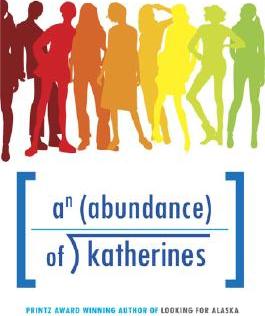“An Abundance of Katherines” by John Green

Though some prefer the more layered nuances of “Looking for Alaska,” or the hilarious tragedy portrayed in “The Fault in Our Stars,” my heart will always belong to “An Abundance of Katherines.”
The book is about a boy prodigy trying to make his mark on the world by making a theorem of when a couple will break up. His inspiration? His 17 previous relationships, all with girls named Katherine.
To start, what truly makes the novel are the characters. The main protagonist Colin, is adorably awkward and oblivious, and he knows it. Though he doesn’t exactly flaunt the fact, he owns it, impervious to everyone’s endeavors to make him “normal,” which is exactly what he is not. But what perhaps makes him better is his loyal best friend, Hassan.
Hassan is a not-so devout Muslim, sheltered in his life and harboring an indelible love for Judge Judy. Hassan may not be strictly halal, but his role as a character is to provide that perspective on life, and the contrast from trying to maintain one’s beliefs in a society that places an emphasis on both the individual and how that individual must conform to the cultural hegemony of America.
It is both of these characters, as well as others that make the novel, are placed in a middle-of-nowhere town, which once again emphasizes each character’s individuality and their place in the universe, a place that Colin struggles with as a person who wants to be great on his own, as well as is expected to be great due to his superior intelligence.
Colin’s intelligence is another defining point in the novel, and the importance placed on this intelligence. Though Colin is a prodigy, he works hard to be one. He studies, he reads, and he remembers. Being a prodigy, of course, makes this easier.In contrast to Colin’s supossed genius, the rest of the characters in the novel are of average intelligence, but each acts to teach Colin through personel experience.
Overall, through the contrast provided in the novel, as well as how the emphasis is placed not on Colin’s intelligence, though important, but his desire to use this intelligence, and others desire to see this intelligence used for the acclaimed “higher purpose” allows the reader to enjoy both the plot and the mathematical concepts worked into the novel, each with varying levels of amusement.










